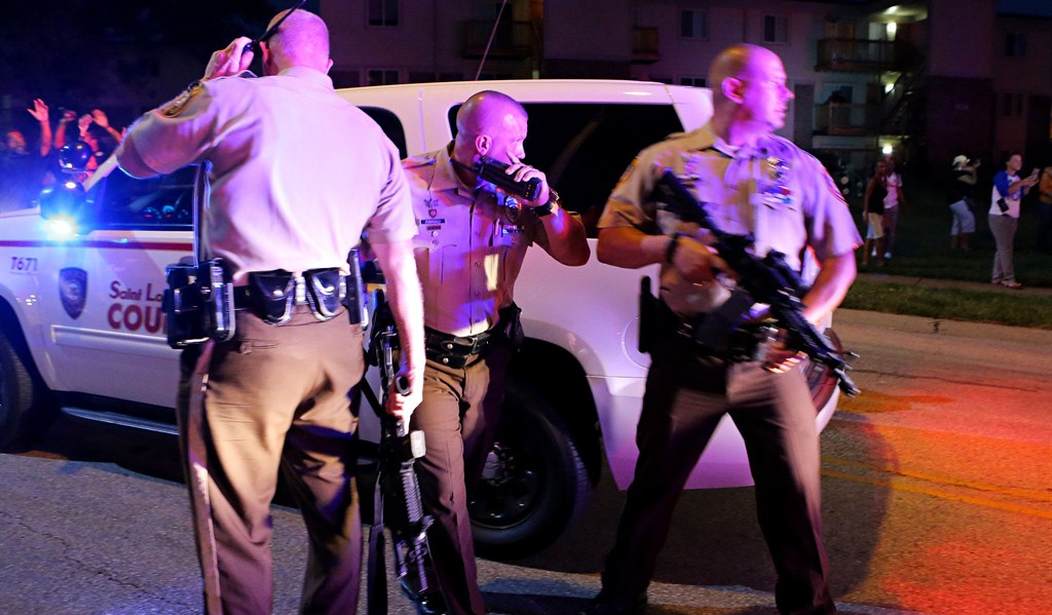A few years ago, when my middle child was in college, he had a summer job in New Mexico. Returning home to Illinois, he drove into Oklahoma, where he was pulled over by a highway patrolman.
He said my son was going 57 mph in a 55 zone, asked him to get into his cruiser and questioned him about where he was coming from and where he was going. Then the trooper said he'd like to search the car.
My son was reluctant, but eventually decided he had no choice but to agree. The officer thoroughly inspected the vehicle, which he damaged in the process, and found nothing.
With that, young Chapman was allowed to go -- without a speeding ticket. But 20 minutes later, another trooper followed him for several miles and pulled him over for an "improper lane change."
My son recounted his previous encounter to the officer, who made a call to confirm it and then explained why he was worthy of so much law enforcement attention: He was a young adult male in a car with an out-of-state license plate and a college decal, driving solo on a major drug trafficking route (an interstate highway) -- as if those factors proved anything.
What the trooper didn't mention is that from a distance, because of his dark hair and complexion, my son might be taken for Hispanic. In any event, he let him leave -- again, with no citation.
If you want to know why many black residents of Ferguson, Mo., distrusted cops even before Brown's shooting, you can assume that practices like this play a role. In 2013, 86 percent of all the traffic stops there involved African-Americans, and they were twice as likely to be subjected to vehicle searches as whites who were stopped.
Recommended
The Ferguson police search blacks more often even though they are far less likely to be found with contraband than whites. These disparities are typical of vehicle "consent searches" in other jurisdictions.
The searches are known by that term because they may not be conducted without the agreement of the motorist. (If the cop has "probable cause" that he'll find evidence of a crime, he can search without asking.) But it's a joke. Few drivers are willing to say no.
Why would anyone -- particularly someone with illegal cargo -- cheerfully agree to have his car ransacked? Because he figures it would be worse to antagonize an armed cop, who might ticket him, arrest him, plant incriminating evidence or even shoot him. In Illinois, about 90 percent of search requests are granted.
Some states and cities have recognized that these requests are inherently coercive and unfairly target minorities. So they have restricted such searches, requiring "reasonable suspicion" of a crime and written consent from the driver. But those limits may be a false comfort.
The Illinois State Police says its officers request permission only when they have reasonable suspicion. But Harvey Grossman, legal director of the American Civil Liberties Union of Illinois, says what the term encompasses is so elastic that "it's no impediment at all."
It's also a lousy guide. Consent searches in Illinois yield contraband in 18 percent of searches. In Missouri, the hit rate is just 24 percent.
A lot of innocent people are delayed, inconvenienced and even humiliated because a cop had some flimsy and usually mistaken basis -- or because the officer's racial biases, conscious or unconscious, set off false alarms. What looks to cops like aggressive law enforcement often looks to victims like harassment and vandalism.
Police are not very good at overcoming those prejudices even when they're revealed. Illinois has been collecting and publishing racial data on traffic stops and searches since 2004, and disparities persist.
It's clear that the only way to protect motorists from being pressured into unwanted, racially skewed searches is to forbid the misnamed consent searches entirely. If cops have clear grounds to think a crime has been committed, they can search anyway. If they don't, they should mind their own business.
Why do so many blacks and Hispanics see the cops as enemies? Because in situations like these, they are.
























Join the conversation as a VIP Member